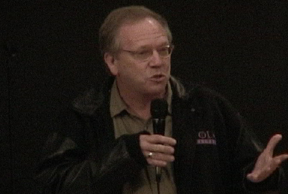

Nick Spitzer and Robert Willey
afterwards at the reception
|
|
|
| Nick Spitzer made some comments about zydeco music and the DVD "From La La to Zydeco Music" at its release party: |
Nick Spitzer and Robert Willey |
I really like what Paul Scott just said because it's so true how far zydeco has traveled. In a sense, you could go back in the nineteenth century and say it's traveled from people playing what we think were the bonzas and the bones, moving to the rub-boards, and the frottoir from the crinkled siding, and moving up into the worlds of being recognized as a music of the entire world. I personally encountered the scene when I was down in the mid-70's. I lived with Bois Sec’s [Alphonse Ardoin] family for about three and a half years.
One
of the things I learned in the Creole communities about family was really from
some of the young guys, some younger than me just said right early on, just
said, "Nick, always be yourself. Don't try and be me or this guy, be who
you are. You can really help us do some things." And, it was a good message
for me, because I learned a lot about music, and speaking the language, and the
dance. I have to say that the Creole community in a lot of ways made me
somebody, because I was able to hear the message of how people had put Africa,
and France, and the Caribbean, and Louisiana together, into this whole land that
was represented by the music, and by all the different things of the community,
from the Mardi Gras, the trail ride, to the grand matriarchs like Marceline
Ardoin and so many others, ladies of the Brun families who run bands.
Just really learn about life, and I think for me personally, it was a
chance to be able to understand that the world is in many ways a Creole world.
We are lucky in Louisiana to have people that identify as Creoles, but much of
the world has some of these processes of people coming together to create new
culture out of things that were there before. In my own life, I look at
And when you come to a document like this, or things that were done back in earlier times by other producers that are unfolding here, what they do, is they make a record of history that says "This is important, this is important to you now, it was important then, and it will be important in the future." I remember when there were some of these same kids when I was out there in the early 70's, and particularly some of the elder parents saying, “Zydeco est mort"—zydeco is really dying now. It just won't be, in another ten years we will have no zydeco." But look what happened—Zydeco completely turned around. Zydeco, whether we like it or not, ended up in Maalox commercials, and Chevy truck commercials. But most of all, zydeco got on stage at that first festival in '82, and Boozoo came back out of retirement to do that festival, and Boozoo stepped forward, and you have a whole new generation of zydeco and nouveau guys coming along who heard music because he was being elevated and raised up by that festival.
©2005 Nick Spiptzer